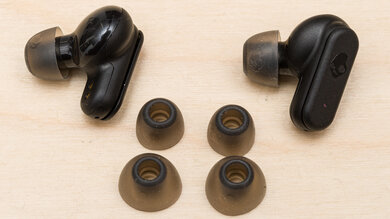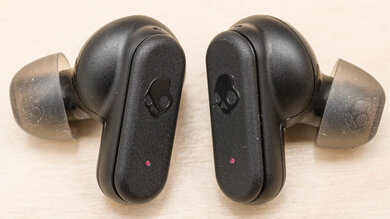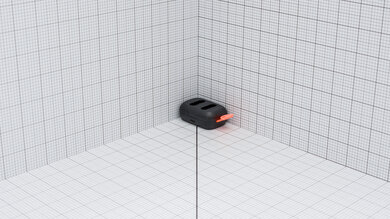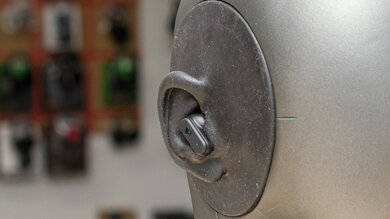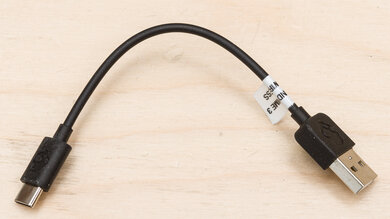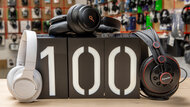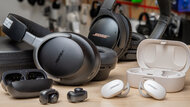The Skullcandy Dime 3 True Wireless are the next generation of the Skullcandy Dime 2 True Wireless. These wireless in-ears have a sleek and lightweight design that builds on the previous generation by introducing handy new features, like Bluetooth multi-device pairing and AI-assisted noise handling technology, at a wallet-friendly price. However, this comes at the expense of other useful features like companion app compatibility and an auto-off function.
Our Verdict
The Skullcandy Dime 3 are great for neutral sound. Their overall sound profile is also more balanced than previous generations. There's plenty of rumble and boom on tap without it muddying the rest of the mix. The mid-range is neutral and pleasing to listen to, with detailed reproduction of instruments and vocals. The treble range reproduction is on the bright side, and sibilants like S and T sounds can sometimes sound harsh. While the three EQ presets are easily accessible through the controls, there are no further sound customization options via a companion app. As with other in-ear designs, they have a poor soundstage performance.
-
Reasonably comfortable and stable fit.
-
Built-in EQ presets.
-
Consistent sound delivery.
-
Bad passive soundstage.
-
No sound customization through companion app.
The Skullcandy Dime 3 are decent for commuting and travel use. Their lightweight and portable design means you can easily stow them in a bag, and their carry case can even be attached to a keychain. They're also reasonably comfortable, and while their eight-hour continuous battery life won't get you through the longest journeys, another two charges are available from the case. Their control scheme isn't the most intuitive to use on the go.
-
Portable and lightweight design.
-
Reasonably comfortable and stable fit.
-
Poor microphone recording quality.
-
Controls aren't the most intuitive to use.
The Skullcandy Dime 3 are great for sports and fitness. These lightweight and portable buds have a reasonably comfortable fit and will stay in your ears while running or hiking. They're also rated IPX4 for protection against water splashes. However, while the control scheme allows you to input a wide range of commands, it's not the most intuitive to memorize and use while exercising.
-
Portable and lightweight design.
-
Reasonably comfortable and stable fit.
-
Controls aren't the most intuitive to use.
The Skullcandy Dime 3 are okay for office use. They're reasonably comfortable, and their in-ear design does a passable job of isolating you passively against office chit-chat. Their battery life performance can get you through an average workday without recharging from the case, and Bluetooth multi-point is useful if you want to connect two devices while working. The integrated mic's poor recording quality means they're not the best choice for online meetings.
-
Portable and lightweight design.
-
Reasonably comfortable and stable fit.
-
Bad passive soundstage.
-
Poor microphone recording quality.
The Skullcandy Dime 3 have a high latency performance when connected via Bluetooth, so they're unsuitable for wireless gaming use.
You can't use the Skullcandy Dime 3 with a wired connection, so they're unsuitable for wired gaming.
The Skullcandy Dime 3 are passable for phone calls. While they're reasonably comfortable and can pair with up to two devices simultaneously via Bluetooth, their integrated mic's quality is disappointing, and your voice will sound thin and distant while on calls. They offer a degree of passive isolation through their in-ear fit that can help isolate you against office chatter, but you'll struggle to take calls in noisier environments.
-
Consistent sound delivery.
-
Poor microphone recording quality.
- 8.0 Neutral Sound
- 7.4 Commute/Travel
- 8.1 Sports/Fitness
- 6.9 Office
- 5.4 Wireless Gaming
- 5.2 Wired Gaming
- 6.4 Phone Calls
Changelog
-
Updated Dec 05, 2024:
The following test groups have been updated following Test Bench 1.7: Noise Isolation - Full Range, Noise Isolation - Common Scenarios, and ANC Wind Handling. In addition, several Sound tests have been updated following Test Bench 1.8. There have also been text changes made throughout the review, including to the usages and product comparisons to match these results.
- Updated Dec 02, 2024: We've converted this review to Test Bench 1.8, which updates our target curve and Sound tests. You can read more about this in our changelog.
- Updated Jul 24, 2024: We've converted this review to Test Bench 1.7, which updates our Noise Isolation test. We've also expanded the scope of this test to include Common Scenarios in addition to Voice Handling and Wind Handling.
- Updated Dec 20, 2023: We've added a comparison between these headphones and the JBL Vibe Buds True Wireless in Comfort.
- Updated Dec 19, 2023: We've added a comparison between these headphones and the Anker Soundcore P25i/P20i True Wireless in Comfort.
Check Price
Differences Between Sizes And Variants
The Skullcandy Dime 3 come in two main color variants: 'True Black' and 'Bone'. In November 2023, Skullcandy also announced a limited edition selection of 'Acid Snow Camo' colorways to celebrate their 20th anniversary, which feature a camouflage patterned design in additional colors: 'Black', 'Slate', 'Meta Mauve' and 'Dark Moss'. We tested the 'True Black' variant, and you can see our unit's label here.
If you encounter another variant, please let us know in the forums, and we'll update our review.
Popular Headphones Comparisons
The Skullcandy Dime 3 are budget-friendly wireless in-ears designed with portability and on-the-go use in mind. They're similar in design and features to the previous generation, the Skullcandy Dime 2 True Wireless, but bring new features to the table, like AI-assisted noise handling technology that helps separate your voice from background noise, as well as Bluetooth multi-point connectivity and a 'Stay-Aware' mode that allows in some external noise so you can hear your surroundings. However, unlike the Dime 2, they can't connect to the Skullcandy app. While they can provide some isolation against ambient noise, their noise isolation performance isn't as good as the ANC-equipped Skullcandy Sesh ANC True Wireless.
Check out our picks for the best cheap earbuds, the best wireless earbuds under $50, and the best wireless Bluetooth earbuds.
The Skullcandy Dime 3 True Wireless and the Skullcandy Smokin' Buds/Buds XT True Wireless are similar buds with different strengths. Both buds have a similar continuous battery life, but the Dime 3 carry an additional half-charge in their case. The Dime 3 also feature multi-device connectivity with Bluetooth, but the Smokin' Buds' mic has better recording quality.
The Skullcandy Dime 3 True Wireless are a slight improvement on the Skullcandy Dime 2 True Wireless. While they have a similar design and portability, the Dime 3 have a far longer continuous battery life and feature multi-point Bluetooth connectivity, so you can connect them to two devices simultaneously. They also have some built-in EQ presets, unlike the Dime 2.
The JBL Vibe Buds True Wireless offer a slightly better performance than the Skullcandy Dime 3 True Wireless. While both buds are well-built, the JBL are more comfortable, have a better overall battery performance, and have a companion app, so you can adjust their sound to your liking. Conversely, the Skullcandy support multi-device pairing, so you can stay connected to your PC and smartphone simultaneously.
The Skullcandy Dime 3 True Wireless and the JBL Vibe Beam True Wireless are wireless in-ears with slightly different strengths. While they're both reasonably comfortable and have a very similar battery life performance, the Skullcandy headphones feature Bluetooth multi-point, making it easy to connect multiple devices while you're at the office or on the go. However, the JBL have a better mic recording quality and noise handling, making them a better choice for calls. They're also compatible with the excellent JBL Headphones app, which lets you customize the sound with a parametric EQ.
The Skullcandy Dime 3 True Wireless are better budget-friendly buds than the Anker Soundcore P25i. While both buds are well-built, the Skullcandy have a more neutral sound profile, which some users may prefer; they can block out more background noise and support multi-device pairing. However, the Anker are more comfortable and have many more EQ presets to help you adjust their sound. Their integrated mic offers a significantly better overall performance, too.
The Skullcandy Dime 3 True Wireless and the Anker SoundCore Life P2 Truly Wireless are similarly performing wireless earbuds, but the Skullcandy offer better features. The Skullcandy have better controls and a longer continuous battery life, making them a great choice for commutes. They also feature Bluetooth multi-point, allowing you to connect to multiple devices while working in the office. On the other hand, the Anker have a longer total battery life, making them a solid choice for long journeys.
Test Results
The Skullcandy Dime 3 look similar to the Skullcandy Dime 2 True Wireless. They have a simple, sleek design with a brand logo positioned high up on each stem. They come in two colorways: 'True Black' and 'Bone'. Skullcandy also announced a limited edition selection of 'Acid Snow Camo' colorways to celebrate their 20th anniversary, which feature a camouflage patterned design in 'Black', 'Slate', 'Meta Mauve' and 'Dark Moss'.
The Skullcandy Dime 3 are reasonably comfortable. They come with three differently sized ear-tips to help you achieve a comfortable fit. They have a deep in-ear fit, which can put pressure on your ear, though, especially when you use the controls. It's also easy to accidentally hit the controls while re-adjusting the fit. Try the Anker Soundcore P25i/P20i True Wireless if you want more comfortable, wallet-friendly buds. The JBL Vibe Buds True Wireless also have a similar style but are more comfortable too.
The controls are decent. They're clicky and responsive in a similar way to the Skullcandy Dime 2 True Wireless. There's audible feedback upon connecting, pairing, or disconnecting and audio prompts for changing the EQ mode or hitting maximum and minimum volume. Unfortunately, due to the deep in-ear fit, pressing the controls can press the buds against your ear canals, which can be uncomfortable. The controls could also be more intuitive: it takes a lot of clicks to input simple commands like decreasing the volume, and there's no default command for skipping tracks. On the bright side, you can input controls from either earbud.
On either earbud:
- Single press: Plays and pauses audio. Also answers and ends a call.
- Double press: Increases the volume.
- Triple press: Decreases the volume.
- Press four times: Toggles between different EQ modes (Music, Bass Boost, Podcast).
- Press and hold: Toggles Stay-Aware (talk-through) mode on/off.
- Press and hold for one second: Activates your device's voice assistant.
- Press and hold for six seconds: Resets pairing list.
They come with a good, lightweight carry case with a braided strap so you can easily attach it to a keychain. There are two openings where you can place the buds. The buds stick out of these openings somewhat, and an LED light on each stem lights up to indicate they're charging.
Like the other earbuds in the Dime series, they have a good build quality. They're made of dense, durable-feeling plastic and certified IPX4 for resistance against water splashes. However, the clicking mechanism used to input controls on the stem feels a little flimsy, and the ear tips feel weak and prone to damage over time.
The Skullcandy Dime 3 have a fairly neutral sound profile, with a warm bass that doesn't overwhelm mid-range instruments. Their treble range reproduction is slightly overemphasized and helps bring out detail in voices and lead instruments, though a sharp peak in the mid-treble can make sibilants sound bright. While you can't adjust the sound profile via an app, you can cycle through three EQ presets (Music, Bass Boost, and Podcast) using the integrated controls.
The Skullcandy Dime 3 have amazing frequency response consistency. Once you get a good seal with the included eartips, you'll experience consistent audio delivery every time you use them.
The headphones have remarkable bass compliance. The response is almost flat across the entire range, giving your audio plenty of thump and rumble. Users who need a bit more bass can activate the 'Bass Boost' EQ mode to add some extra boom to their mixes.
Their mid-range target compliance is superb. The response is quite flat across the entire range. While a slight dip in the low-mids thins out vocals slightly, they still have plenty of detail and clarity. On tracks like Shania Twain's That Don't Impress Me Much, both the electric guitar and the lead vocals sound balanced and present in the choruses amid dense layers of pop production.
The treble target compliance is outstanding. Most of the range is balanced, but there's a peak in the mid-treble that adds brightness and sizzle to sibilants, which can sometimes be piercing.
These earbuds have an amazing peaks and dips performance. They generally follow their own sound profile well across the bass and mid-range regions, but a couple of peaks in the low- and mid-treble can make sibilants, like S and T sounds, a little harsh and piercing. The drivers are also slightly mismatched in the bass region, as well as the low- and mid-treble areas. This can make audio can feel a touch lopsided at times.
The Skullcandy Dime 3 have a great imaging performance. Most of the Skullcandy headphones we've tested have had a good imaging performance, which indicates the manufacturer's quality control and ergonomics. Our unit's weighted group delay falls below the audibility threshold, resulting in tight bass and transparent highs. The left and right drivers are reasonably well-matched in amplitude and frequency, but there's some phase mismatch in the mid-range. While this is difficult to hear in real-life content, it can make it harder to perceive where voices and instruments are coming from within the stereo image. That said, imaging performance tends to vary between units.
These buds have an awful passive soundstage performance, which is normal from in-ear headphones. In-ear designs allow for very little interaction with the outer ear, resulting in a soundstage lacking the immersive quality of open-back headphones. Audio seems like it's coming from inside your head rather than from speakers placed around you.
The weighted harmonic distortion performance is good. While there are a few peaks in the high-bass and low-treble at normal listening levels, they'll be tough to hear for anyone who's not an astute audiophile. Otherwise, all frequencies fall within good limits, and the resulting audio reproduction is clean and pure.
These are the settings used to test these headphones; our results are only valid in this configuration.
The Skullcandy Dime 3 have an alright noise isolation performance. They don't have ANC, but their in-ear design provides a degree of passive isolation, which can help block out higher-frequency sounds like fridge hum along with some mid-range sounds like background conversations. However, they offer very little isolation against bass-range noise like engine rumble.
These headphones do a sub-par job of blocking out everyday sounds, but that's to be expected since they don't have ANC. Bass-range sounds, in particular, will make their way into your audio, so these aren't a good choice for using on a train or plane. They'll fare better in an office, where the mid-range chatter of your colleagues and the high-pitched whine of a nearby fan are noticeably reduced.
They have an outstanding leakage performance. Even at high volumes, the level of leaked audio is very low and concentrated in the treble range, where it sounds tinny. Even if you're cranking your tunes in the office, others around you won't be able to hear what you're playing.
The integrated mic's recording quality is disappointing. While your voice is understandable, it lacks body and sounds distant.
The mic has an alright noise handling performance. These buds use AI-assisted technology to help isolate your voice against background noise and this means their performance is better than their predecessor in this regard. This technology does a great job of tackling consistent sound, like background chatter at the office. However, your voice will easily be drowned out if you're in a place with loud, inconsistent noise, like on a busy street.
The Skullcandy Dime 3 have a satisfactory battery performance. The manufacturer advertises eight hours of continuous battery life, with two additional charges from the case. We measured slightly more than this, but battery life tends to vary based on use. The manufacturer claims the quick-charge feature will add two hours of battery life with a quick ten-minute charge. You can even play audio from one bud while the other one charges. Frustratingly, these buds lack the power-saving features found in the Skullcandy Dime 2 True Wireless, so they won't turn off automatically after a certain amount of inactivity.
These earbuds are incompatible with the Skullcandy app but are compatible with the Tile app, which you can use to locate your buds if you lose them.
Their Bluetooth performance is very good. While they don't support Google Quick Pair or Microsoft Swift Pair, these buds feature multi-device pairing, allowing you to pair with up to two devices via Bluetooth. Latency via the default SBC codec is quite high, so your audio and video will be out of sync when watching videos. They also support AAC codec, which is an alternative to SBC and offers slightly better audio quality. However, you'll be disappointed if you want to stream hi-res audio with these earbuds since they don't support codecs like aptX Adaptive or LDAC, which are designed for this purpose.
These buds are only compatible with Bluetooth-enabled PCs. You can't connect them in any other way.
The Skullcandy Dime 3 come with a lightweight charging case that carries roughly two additional charges. You can charge the case using the included USB-A to USB-C cable. Sadly, it can't charge wirelessly.
Comments
Skullcandy Dime 3 True Wireless: Main Discussion
Let us know why you want us to review the product here, or encourage others to vote for this product.
Update: The Stereo Soundstage section mentions the TCL Q85H.
- 21010
Hello…I’m looking at getting the S80QY but I have a 75” Sony X85K. Have read that Sony does not pair well with anything but Sony and LG in particular would be a problem. That said, I have read that others have been able to pair properly. Is this accurate? Would like to hear your thoughts on this. Thank you.
Hey there. We aren’t aware of any issues pairing an LG soundbar with a Sony TV, and it’s not an issue we’ve ever encountered. Both the TV and the soundbar supports eARC, so there really shouldn’t be any compatibility problems. It might be worth reaching out to LG to ask them about this, but as far as we know, you shouldn’t have any issues. Thanks!
- 10-100
Hello…I’m looking at getting the S80QY but I have a 75” Sony X85K. Have read that Sony does not pair well with anything but Sony and LG in particular would be a problem. That said, I have read that others have been able to pair properly. Is this accurate? Would like to hear your thoughts on this. Thank you.
Update: Converted to Test Bench 1.2. Updated the results for audio format support via ARC/eARC, HDMI In, and Optical. Added Video Passthrough to TV results as well.



